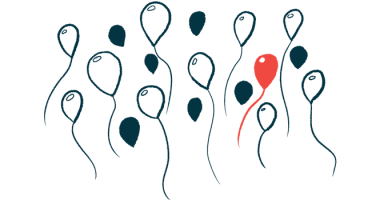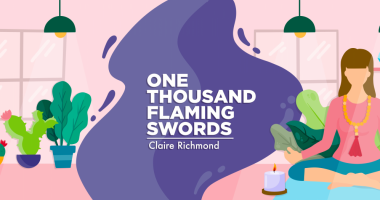The Challenge of Abstaining from Alcohol to Manage My Acute Porphyria

I tugged at my biking shorts and unlatched my helmet. My person and I locked up our bicycles outside a trailside brewery and went inside for a drink. Thanks to RAGBRAI, a hugely popular bicycle ride across the state of Iowa, a serious biking and bars culture has taken root here. Before I was diagnosed with acute hepatic porphyria (AHP), this was our typical summertime weekend activity.
That particular day was hot, and I felt the dampness cool on my skin as I entered the air-conditioned taproom. Scanning the handwritten menu displayed on chalkboards behind the bar, I searched for a nonalcoholic option. Disappointingly, I found only root beer. I don’t particularly like pop, or drinking anything that coats my mouth with sugar and leaves me yearning for a toothbrush.
Suddenly, I sensed the beer list beginning to blur. Heaving, I beelined for the bathroom and locked the door. With my back against a wall, I suppressed sobs. I was mere months into my AHP diagnosis and spinning out of control. Despite my best efforts, pieces of my former life were falling away, slipping out of my grasp as my body sought space and stability. I had lost my job, stamina, physical strength, community leadership positions, and even friendships.
I no longer knew my body; it was a master I tried to please. Everything I did was a fight. Everything I consumed was a bargain. Early on, I learned that alcohol had devastating effects on me. A single beer was enough to flare my symptoms. Wiping away tears, I filled my belly repeatedly with air. I regained my composure and found my way out to the patio, where my person waited with a glass of cold water.
It’s not that I love beer, although I do. It’s that alcohol represented just another facet of my old life that no longer fit. After that dramatic day, I took a break from biking to the bars.
‘You don’t drink? I’m sorry.’
Birthdays, happy hours, concerts, camping trips, wine tasting, home brewing, party buses, and fake IDs — the United States is obsessed with drinking. Society taught me two things from an early age:
- Drinking makes everything more fun.
- Sobriety only makes sense to others if you are recovering from alcoholism, a self-righteous teetotaler, or pregnant.
I’m baffled by how often I’m asked why I’m not drinking at a party or a dinner. When I started abstaining from booze in public settings, I immediately faced questions and teasing twinged with judgment. It was challenging. But if I’m honest, it wasn’t all that long ago I shared similar thoughts about someone choosing to abstain, who wasn’t the designated driver.
I will respond depending on how well I know the inquirer, keeping in mind that it is not my job to educate, nor is it my responsibility to guard them from the discomfort of learning about my AHP. If I don’t know the person well, I may respond with: “Water is all I need this evening.” Or, if I have the energy to talk about it, I may say: “My body doesn’t tolerate booze these days.” Often the latter leads into a conversation about my rare disease and advocacy work.
My alcohol-free drink menu
More and more people are choosing to avoid alcohol for a variety of reasons, and the last few years have given way to an increase in nonalcoholic alternatives. “Mocktails” and zero-proof beers are becoming easier to find out at bars and are being enjoyed at home. I will go out of my way to visit breweries that offer kombucha, a deliciously bubbly fermented tea, and I haven’t met a bartender yet who was unwilling to whip up a juicy mocktail.
Some of my favorite alcohol alternatives to keep on hand are:
- Kombucha, like GT’s Lavender Kombucha
- Nonalcoholic India pale ale, like Lagunita’s IPNA
- Hop water, like Lagunita’s Hoppy Refresher
- Flavored sparkling water, like LaCroix
- Ginger beer, like this option from Q Drinks
If you’ve recently been diagnosed with a condition that’s complicated by booze, it can be a hard lifestyle shift. Even if you’re not a big drinker, we live in an alcohol-obsessed society, and many social events are built around drinking. The simple act of turning down champagne at a wedding can elicit judgment and be a painful reminder of our disease. It can also be a critical opportunity to care for ourselves.
I’ve learned a lot since becoming “designated sober.” It’s taken a few years, but I no longer view abstaining from alcohol as a grievance, but rather a fierce act of self-love. If you are stepping into a life of sobriety or simply avoiding alcohol, be gentle with yourself, and remember you are not alone.
***
Note: Porphyria News is strictly a news and information website about the disease. It does not provide medical advice, diagnosis, or treatment. This content is not intended to be a substitute for professional medical advice, diagnosis, or treatment. Always seek the advice of your physician or other qualified health provider with any questions you may have regarding a medical condition. Never disregard professional medical advice or delay in seeking it because of something you have read on this website. The opinions expressed in this column are not those of Porphyria News or its parent company, BioNews, and are intended to spark discussion about issues pertaining to porphyria.







Comments